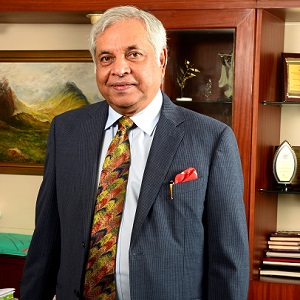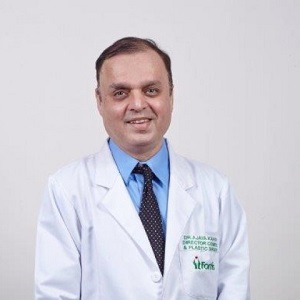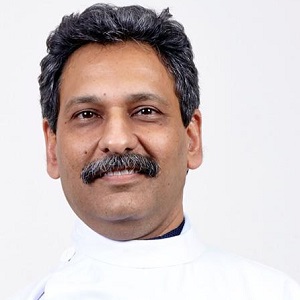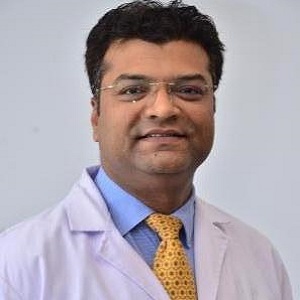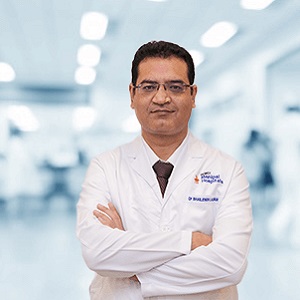Best Doctors in India for Alcoholic Hepatitis Treatment
- Bariatric & Laparoscopic Surgeon, New Delhi, India
- Over 45 years’ experience
Profile Highlights:
- Dr. Pradeep Chowbey is an internationally known pioneering laparoscopic surgeon, who has over 45 years of surgical experience. Throughout his career, he has trained over 20,000 surgeons from around the world in minimally invasive surgeries.
- He is one of the first to perform laparoscopic cholecystectomy in North India and the first to perform MAFT (Minimally Invasive Fistula Technology) in the Asia Pacific Region. He has graphed his career with singular determination to develop, evaluate, and propagate Minimal Access, Metabolic & Bariatric Surgery in India, and the Asian subcontinent.
- His Institute at Max Healthcare was the first to receive the Center of excellence accreditations in India for Metabolic & Bariatric Surgery, Hernia Surgery by Surgical Review Corporation, USA (2011-2014)
- Plastic & Cosmetic Surgeon, Gurugram, India
- Over 35 years’ experience
Profile Highlights:
- Dr. Ajaya Kashyap is one of the most reputed plastic surgeons in India with over 35 years of experience. He completed his residency in Surgery at Robert Packer Hospital (Guthrie Clinic), Sayre, Pennsylvania, USA. He completed his Fellowship in Plastic and Reconstructive Surgery at University of Massachusetts Medical Center, Massachusetts, USA in 1997.
- Dr. Kashyap practices cutting-edge Plastic Surgery including the latest innovations in Minimal Access and Endoscopic Cosmetic Surgery. He also performs state-of-the-art laser procedures, power-assisted liposuction, short scar anatopexices, and the latest techniques in facial cosmetic surgery, rhinoplasty, and body contouring. He also is a leader in reconstructive and hand surgery.
- Obstetrician & Gynaecologist, New Delhi, India
- Over 39 years’ experience
Profile Highlights:
- Dr. Madhu Roy is one of the leading Gynecologists and Obstetricians in India, practicing successfully for about 39 years. Dr. Roy practices at Indraprastha Apollo Hospital as a Senior Consultant.
- She assists patients by treating Uterine Fibroids, ovarian cysts, Endometriosis, Robotic Surgery, Subfertility, Pelvic Organ Prolapse, Gynecological Cancers, and any other conditions with her experience.
- Dr. Madhu Roy also provides counseling on contraception, medical termination of pregnancy, biopsies, laparoscopic surgery, and fertility preservation procedures.
- Endocrinologist & Diabetologist, Chennai, India
- Over 14 years’ experience
Profile Highlights:
- Dr. Sruti Chandrasekaran is an American board-certified endocrinologist and diabetologist practicing at the Dr. Rela Institute in Chennai as a senior consultant who treats innumerable diabetic patients.
- Ever since she moved back from the University of Maryland she has been heading the endocrine department and managing various endocrine inpatients and outpatients.
- Dentist, Gurugram, India
- Over 20 years’ experience
Profile Highlights:
- Dr. Payal Nayar has been practicing dentistry for the pediatrics department for the last 20 years.
- She has expert hands in oral rehabilitation, pediatric root canals, orthodontic treatment, rampant caries, etc.
- She received Certification in the field of Prosthetic Dentistry from Smile India.
- Dentist, Gurugram, India
- Over 20 years’ experience
Profile Highlights:
- Dr. Vineet Ohri is one of those prominent dentists in India who has received special training in Endodontics.
- He has 20 years of experience in treating patients.
- Dr. Ohri worked in prominent hospitals like Indraprastha Apollo and Fortis Hospital, Vasant Kunj.
- Thoracic Onco Surgeon, New Delhi, India
- Over 30 years’ experience
Profile Highlights:
- Dr. Sabyasachi Bal specializes in Thoracic Onco surgery and provides treatment for lung cancer, chest cancer, and other types of thoracic malignancies.
- He has over 30 years of experience in the field and has reformed thoracic cancer surgery in India. He has also added Robotic Thoracic Surgery to his list of specializations.
- Dr. Sabyasachi Bal’s primary focus lies in the management and treatment of cancers affecting the thoracic regions and organs near the lungs and chest of both adolescents and adults.
- Liver Transplant Surgeon & HPB Surgeon, New Delhi, India
- Over 20 years’ experience
Profile Highlights:
- Dr. Bhushan Bhole is a well-known Liver Transplant Surgeon & HPB Surgeon who has done Advanced Fellowship in Liver Transplantation & Fellowship in Advanced Laparoscopic Surgery, in Birmingham, UK.
- He is an active member of several national surgical associations such as ASI, IASG, IHPBA, ACRSI, MAS, IAGES, IHA & IMA. He has also been awarded many fellowships like FACRSI, IAGES & FMAS.
- Liver Transplant Surgeon & HPB Surgeon, New Delhi, India
- Over 19 years’ experience
Profile Highlights:
- Dr. Shailendra Lalwani is a renowned gastroenterologist at Manipal Hospitals, Dwarka, New Delhi, who has over 19 years of experience as a specialist. His expertise lies in Liver Transplantation and Hepato-pancreatic biliary surgery.
- For his outstanding contributions to the field of gastroenterology, Dr. Shailendra Lalwani has been honored with several awards and recognition. He is also an active member of the Delhi Medical Council.
- Uro - Oncologist, Gurugram, India
- Over 19 years’ experience
Profile Highlights:
- Dr. Amit Goel is a well-known Uro- Oncology and Robotic Surgeon and has expertise in Open, Laparoscopic, and Robotic Urology cancer surgeries. He has done Observership at M D Anderson Cancer Center, Houston, Texas, US
- Dr. Amit has previously worked as Senior Consultant and Head in Apollo Hospitals Dhaka, where he was the Pioneer in many Laparoscopic Cancer surgeries like Laparoscopic Partial Nephrectomy for Kidney Tumor, Laparoscopic Radical Cystectomy for Cancer Bladder, Orthotropic Ileal Neobladder Reconstruction for Cancer Bladder, etc.
Best Hospitals in India for Alcoholic Hepatitis Treatment
ALCOHOLIC HEPATITIS
Alcoholic hepatitis is a liver infection, which is mainly caused by frequent, heavy use of alcohol. Fat can build up in the liver cells, which might lead to inflammation as well as scarring of the liver.
Alcoholic hepatitis might be mild or severe. A patient might even need a liver transplant if proper treatment is not provided, or if they don’t stop consumption of alcohol.
It is also notable that all heavy drinkers don’t develop this condition, and sometimes this condition even develops in people who drink moderately. However, if you are diagnosed with this condition, it is important for you to quit drinking alcohol. People who continue drinking alcohol might face a huge risk of serious liver damage as well as death.
Symptoms
Depending on the amount of damage to the liver, the symptoms can vary. If you are having a mild form of the disease, you might not even experience any symptoms at all. However, as the damage continues to grow, you might experience the following:
- Changes in appetite
- Dry mouth
- Weight loss
- Pain or swelling in the abdomen
- Jaundice, or yellowing of the skin or eyes
- Fever
- Nausea and vomiting
- Easy bleeding or bruising
- Changes in your mental state, including confusion
- Fatigue
The symptoms of this condition are similar to those caused by a few other health conditions. Therefore, if you develop any of these symptoms, it is best to get a proper diagnosis as well as begin treatment.
Causes & risk factors
Alcoholic hepatitis generally develops when the alcohol you drink causes damage to your liver. However, it is not clear why alcohol does this damages only to some heavy drinkers.
Few factors that are known to play a role in this condition include:
- The body’s process that breaks down alcohol produces some toxic chemicals
- These chemicals can trigger inflammation that can destroy the liver cells
- Thus, over time, scars replace healthy liver tissue, thus interfering with the function of the liver
- This irreversible scarring, which is also termed cirrhosis, is the final stage of alcoholic liver disease
If you have hepatitis C and continue to drink, even moderately, you are more likely to develop cirrhosis.
Some heavy drinkers are also malnourished because they don’t eat a proper balanced diet. Alcohol and its byproducts also prevent the body from absorbing nutrition properly. Lack of nutrition can contribute to liver cell damage.
Some other risk factors that can lead to this condition include:
- Your sex- Women are usually at a higher risk of developing alcoholic hepatitis since the way alcohol is processed in women is different.
- Binge drinking- Having over five drinks within two hours for men and four or more for women can increase the risk of alcoholic hepatitis.
- Obesity- Heavy drinkers who are overweight are also more likely to develop alcoholic hepatitis and to progress from that condition to cirrhosis.
- Race and ethnicity- Hispanic and Negroid people might be at higher risk of alcoholic hepatitis.
- Genetic factors- According to studies, there may be a genetic component in alcohol-induced liver disease. However, it is difficult to separate genetic and environmental factors.
Diagnosis
If you are showing symptoms of alcoholic hepatitis, your doctor will first inquire about your medical history and alcohol consumption. Next, he/she will perform a physical exam to see if you have an enlarged liver or spleen. They might also need a few more tests to confirm your diagnosis, such as:
- Complete blood count (CBC)
- Liver function test
- Ultrasound of the liver
- Abdominal CT scan
- Blood clotting tests
In some cases, a liver biopsy might also be needed to confirm the diagnosis of alcoholic hepatitis. A liver biopsy requires your doctor to remove a tissue sample from your liver, which is then tested in the lab. This method helps to show the severity and type of liver disease.
Treatment
Stopping alcohol consumption is the most important treatment for alcoholic hepatitis. There is no cure for this condition, but treatment can help in reducing or eliminating symptoms, or stopping its progression.
It is also important to note that scarring of the liver is permanent, but treatment can aim to restore as much function as possible.
Dietary changes
Medication
Liver transplant
The best hope of recovery is to be aware of the signs and symptoms as well as to reduce, manage, or if possible, completely stop consumption of alcohol.
Complications
Alcoholic hepatitis might lead to severe other complications such as:
- Enlarged veins (varices)- In this condition, blood that is unable to flow freely through the portal vein, can back up into other blood vessels in your esophagus or stomach.
- Hepatic encephalopathy- This condition can be caused by the buildup of toxins if your damaged liver is unable to remove all the toxins from your body. It involves confusion, drowsiness, and slurred speech.
- Ascites- Ascites is a condition in which the fluid that accumulates in the abdomen may get infected and thus, require treatment with antibiotics. Although this condition is not life-threatening, it can be a sign of advanced alcoholic hepatitis, or cirrhosis.
- Kidney failure- A damaged liver affects blood flow to the kidneys, thus resulting in kidney failure.
- Cirrhosis- The scarring of the liver might lead to liver failure.
Prevention
Alcoholic hepatitis might be prevented if you take the following steps:
- Drink alcohol in moderation, if at all- For healthy adults, moderate drinking means no more than one drink a day for women of all ages and men older than 65, and not over two drinks a day for men aged 65 and younger. However, if you prevent all alcohol, it is a certain way to prevent this condition.
- Check before mixing medications and alcohol- Ask your doctor if it’s safe to drink alcohol while you are taking medications. Consider reading the warning labels on over-the-counter medications as well. Don’t drink alcohol when you are taking medications that warn of complications when combined with alcohol.
- Protect yourself from hepatitis C- Hepatitis C is an infectious liver disease that is caused by a virus. If it is left untreated, it may lead to cirrhosis. If you are having hepatitis C and you consume alcohol, you’re generally more likely to develop cirrhosis than if you don’t drink.

